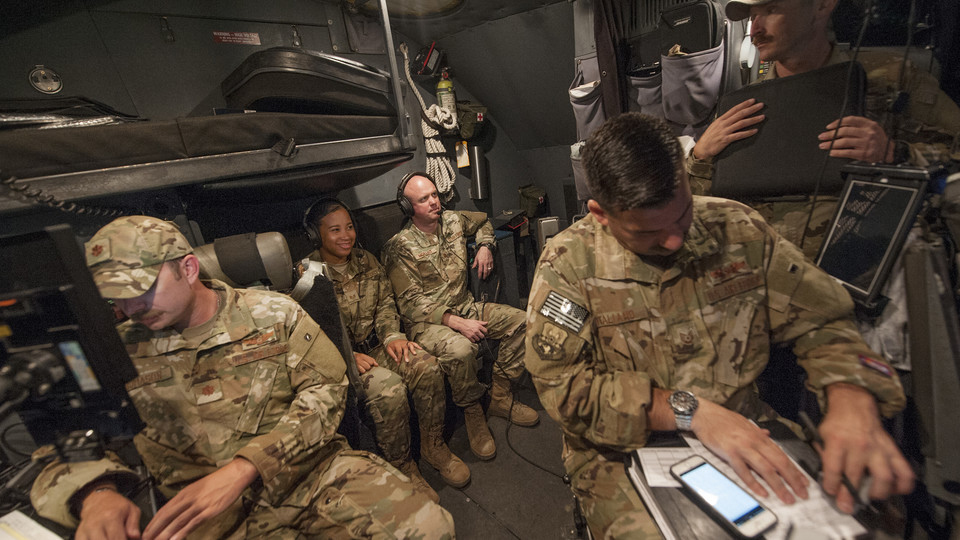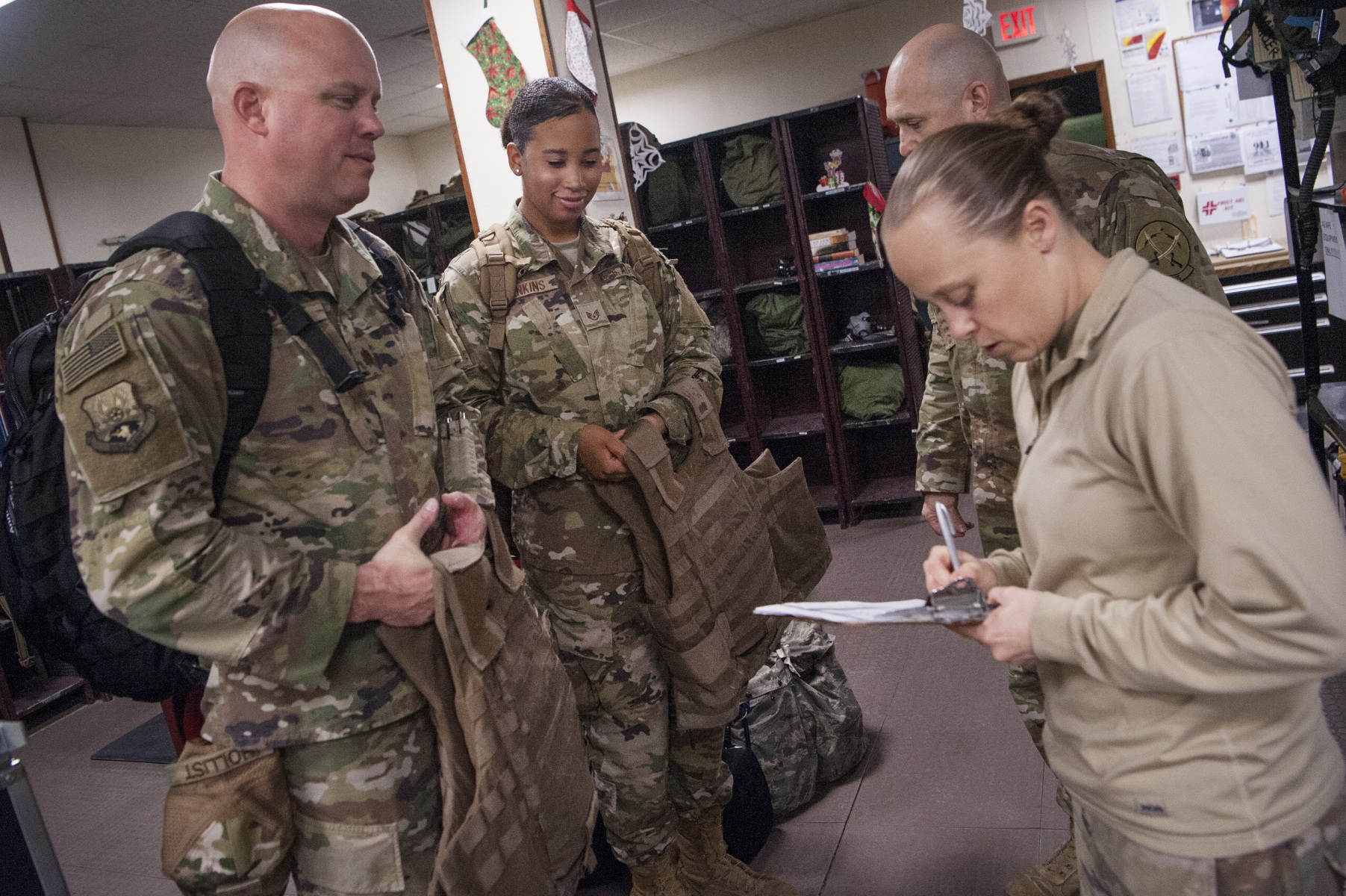
Hollist takes to skies to help military forces
11 Nov 2019 By Dean Gayman | University Communication
A little over 10 years ago, Cody Hollist could see someone close to him struggling with post-traumatic stress disorder following a military deployment. He realized he had the skill set to help — not only his friend, but many service members.
“My family-therapy practice is mostly with people who have experienced abuse or other severe trauma (that) often leads to PTSD, so there seemed to be an overlap of what I do professionally and what the military needed,” said Hollist, associate professor of child, youth and family studies and director of the university's Marriage and Family Therapy program.
Hollist decided to join the Air National Guard with the purpose of guiding military members and their families through trauma.
“I was a missionary in Brazil when I was younger and was the head of my congregation at church, so that fit the Department of Defense requirements, and the planets aligned, and I became a chaplain,” Hollist said.
Chaplains have a special role in the Armed Forces, Hollist said. They not only ensure service members’ exercise of religion but also serve in a counseling capacity and have complete confidentiality when doing so.
“Unfortunately, service members often won’t go to mental health providers, because in the military, mental health providers are often required to share information with commanders, so service members are afraid of losing their jobs,” Hollist said. “Chaplains are the only people who have complete confidentiality in the military, so most of my time is spent helping people deal with trauma.”
For most of his Air National Guard career, Hollist has stayed stateside, but he was deployed to Al Udeid Air Base in Qatar in July 2018. There he flew on cargo missions and aeromedical evacuations all over the Middle East.
“The people I needed to take care of were on flights, so I flew with them,” Hollist said. “And patients being evacuated out of a combat zone find it really comforting to have a chaplain on board. I spent most of the time on the planes talking to people.”

Picture Courtesy U.S. Air Force
Tech. Sgt. Ashley Solum (right), 379th Expeditionary Operations Support Squadron aircrew flight equipment technician, issues AFE gear to Chaplain (Maj.) Cody Hollist (left) and Staff Sgt. Daneasha Jenkins (center left), both assigned to the 379th Air Expeditionary Wing (AEW) chaplain office, Dec. 15, 2018, at Al Udeid Air Base, Qatar. While Hollist and Jenkins are assigned to the 379th AEW, they are attached to the 379th Expeditionary Operations Group. Hollist, a chaplain, and Jenkins, a chaplain’s assistant, fly with aircrews to support missions such as passenger transportation, air drop, and aeromedical evacuation by providing spiritual support to aircrews both on the ground and in the air.
He also identified a gap in mental health services available to deployed members: marriage counseling.
“The deployments were six months long, and around month four, the No. 1 inquiry that the legal department was receiving was regarding divorce and custody cases,” he said.
Hollist said long-term separation would be hard for any couple, but when one or both members of a couple are in the military — especially in a combat zone — it can be especially difficult.
“You’re surrounded by insecurity all over the place, and by life-and-death situations all the time,” he said. “And it’s hard to see your family going through difficult things back home. Most service members have a natural desire to take care of and protect others — it’s one of the things that motivates them to stand up and fight for freedom — and of course that extends to your family. That’s a tough disconnect.”
The cycle of stress continued to play out — relationship troubles affecting the job, and the stress of the job affecting the relationship — and Hollist wanted to end it.
Again, he had a special skill set to do so.
“Because Nebraska is a rural state, our department here has been doing distance therapy since 1999 — when it was closed-circuit TV — and we have the research to show distance therapy is effective,” Hollist said. “If I didn't already have that training, and if I wasn't already committed to that, I think I would have been frustrated with the lack of ability to work with them.”
Hollist said he was able to counsel many of those deployed with him, along with their spouses, and realized that distance therapy could be used on every base in deployed locations. Utilizing distance therapy would require some training, but that training would be minimal, he said.
“And the technology already exists,” Hollist said. “Things like secure Zoom are everywhere.”
Before Hollist returned to the United States in January, he’d gathered support for distance therapy on base in Qatar.
“Our greatest advocates were the doctors in the medical clinic. They were saying, ‘Yes, please, let's figure out how to do this,’” Hollist said. “If we could intervene with the couples, they believed it could decrease the suicide discharges. As doctors worked with a service member who had become suicidal, they would often go through their history and the progression of problems that have happened. Usually, it started with issues in family relationships back home.”
Hollist has been working with three Husker colleagues to develop a training that could be completed by chaplains and mental health providers at the beginning of each deployment to boost confidence in doing distance couples counseling. His goal is to make the training available and then work with the various branches of the Armed Forces to put it into place.
“We’d like to say, ‘We have this training, and it takes three hours, and we’ll provide ongoing support while you learn how to do it,’” he said.
Child, Youth and Family Studies